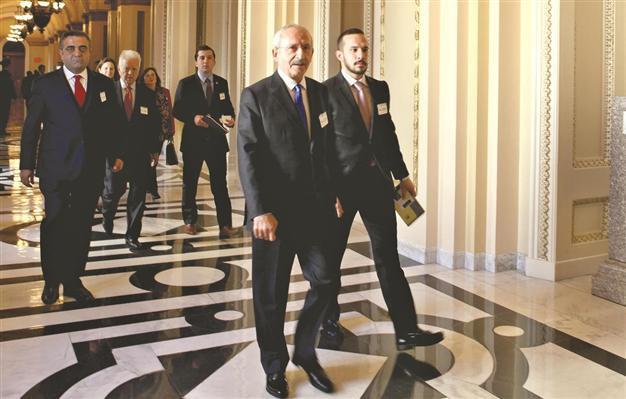Istanbul mayoral race caught on Washington radar

Main opposition Republican People’s Party (CHP) leader Kemal Kılıçdaroğlu, accompanied by a a delegation, held a four-day visit to Washington. AA photo
The questions about Turkey asked in the decision making and opinion generating bodies in Washington DC are based on two different types of sources. One group stems from questions asked to the Turkish main opposition Republican People’s Party (CHP) leader Kemal Kılıçdaroğlu by his counterparts in the U.S. administration, Congress, think tanks, etc. during his contacts in the U.S. capital on Dec. 1-4. The other group comes from my observations from contacts in DC, mostly on an off-the-record or background basis.
There is a new American interest in Turkish domestic politics, which is showing itself more than usual, focusing on the coming three elections in Turkey, with a particular interest shown in the mayoral election in Turkey’s largest city: Istanbul.
It is obvious the Gezi Park protests and the government’s methods in suppressing them have agitated the already existing interest in Turkish politics. Those interested in Turkey in DC are still trying to understand the social and political dynamics behind Gezi, asking questions about how that could be reflected in the ballot box and the change in the level of pressure on Turkish media before and after Gezi.
The result of local elections to be held on March 30, 2014 is a matter of interest in that regard, with particular focus on Istanbul.
Istanbul elections have been one of the most asked questions to the CHP leader in DC, together with relations with Israel. Americans are trying to understand whether the CHP will be able to get Istanbul from AK Parti or seriously close the gap, thinking it could change the political atmosphere in Turkey.
That is one of the reasons that interest is being shown to the Turkish opposition, together with Gezi.
There are also questions who will be the next president of Turkey and what if Erdoğan replaces President Abdullah Gül in August 2014, what would Gül do, whether he would accept to be a low profile prime minister as Erdoğan would like to see, how will that effect Turkey’s domestic and foreign policy line and how could that change the composition of the next parliament in the general elections planned to take place in 2015.
The questions also focused on Turkish foreign policy in the light of the U.S. interests.
These are the questions from the one given the biggest importance to lesser:
1 - Turkish-Israeli relations: It was U.S. President Barack Obama who facilitated Israeli Prime Minister Benjamin Netanhayu’s telephone apology from Turkish Prime Minister Tayyip Erdoğan in March 2013 because of killing of 9 Turks by Israeli commandoes on board the passenger ship Mavi Marmara defying the embargo on the Palestinian territory of Gaza in May 2010. But no improvement was recorded since then and a statement by Erdoğan in August accusing Israel of being behind the July 3 coup in Egypt has still have negative effects on Turkish-U.S. relations. The last call between Obama and Erdoğan was announced to take place on Aug. 7. (When asked, Kılıçdaroğlu said what Israel did was unacceptable and should be compensated but if the CHP had been in power he would not have let the ship sail under those circumstances, at the first place.
2 - Chinese missiles: Turkish Foreign Minister Ahmet Davutoğlu’s recent contacts in Washington DC during which he assured American counterparts that the decision to buy Chinese air defense missile systems was not a final one have seemingly decreased the level of alert. With determination that if Turkey goes for Chinese, it will not be plugged into the NATO system, the U.S officials wait for the final answer of Turkish government.
3 - Syrian civil war: There has been some improvement regarding the distance between the views of Turkey and the U.S. following Davutoğlu’s recent visit to DC, in the framework of the second Geneva talks. There might be more U.S. support for Turkey’s efforts for refugee flood, with questions lingering about links of radical Islamist elements within Turkey.
4 - Worsening relations with Egypt: The U.S. wants Turkey and Egypt as two important allies in the East Mediterranean to normalize relations, as in the case of Turkey-Israel. But latest statements which ended up in sending Turkish ambassador back and decreasing the level of diplomacy by Egypt with no step back by Erdoğan government increase uncertainties on the issue in the U.S. capital.
There are also questions regarding Iran’s nuclear program, but since Turkey has welcomed the US initiative to shake hands with Iran, Turkish attitude is not a high priority for the time being. It can easily be said that Turkish elections and Turkish opposition have taken place in the radar screens in the U.S. capital already.
